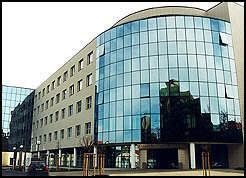 Investment opportunities and regions Investment opportunities and regions |
As a transition economy, the Czech Republic still needs to attract foreign investors that bring not only new jobs and money but also know-how and modern technology. To help them move into the Czech Republic, the social democratic government improved the country's investment incentives act. "First of all, we reduced the necessary minimal size of investment from USD 10 mln. to USD 5 mln.," explains Finance Minister Mertlik. Another major improvement was the extension of tax holidays from five to ten years, and the whole act has become more flexible. Other incentives, such as pre-invested land available for free or symbolic price only, workforce retraining subsidies or tax-free import of high-tech equipment have remained in place and are now used more extensively due to the lower investment limit. "However, the incentives are not the most important factor that should be on the investors' mind," points out deputy finance minister Mladek. "This is a country full of possibilities thanks to its very old industrial tradition and qualified labor force. What is missing are some management abilities, so if a company comes here with only a few people, there is a potential of huge benefits," Mladek explains. There are also obviously opportunities into the possibility of acquiring cheap assets from many Czech companies on the verge of bankruptcy.
A case in point to illustrate the importance of moving quickly may be the tobacco company Philip Morris that acquired in 1992 the state-owned tobacco company Tabak. According to Ian Ferguson, managing director of Philip Morris for the Czech Republic, the acquisition gave his company an immediate 80% market share, as well as production sites with trained labor force. Even though Philip Morris had to invest into modernizing the production facilities, it has apparently been a worthwhile investment as the company holds top positions among the best Czech companies, whether measured by turnover or net profit. "Moreover, we appreciate the approximation of the Czech legislation towards EU standards," points out Ferguson. "In our industry, we have made advances as far as waste laws, labeling or product regulation are concerned but there is ground to make up in some areas, especially in tax harmonization," he adds.
Besides large companies like Philip Morris, many Czech regions see a revival of small businesses. According to Frantisek Sucha, chairman of the board and managing director of Zapadoceska Energetika, western Bohemian energy distributor, many of the new enterprises are being funded by German capital and established by the Czech-German border. | 
Small and medium-size companies are also supported by a series of governmental programs, most of them administered via Ceskomoravska zarucni a rozvojova banka (Czech-Moravian Guarantee and Development Bank). "The main role of the bank is to provide guarantees, low-interest loans, financial credits and interest bonification," explains the bank's CEO Ladislav Macka. In general, his bank should make access to capital easier for small and medium-sized enterprises and make sure their financing is effective.
The government is also supporting the creation and development of industrial zones, i.e. pre-prepared areas in or around larger towns slated for development. Such zones also have prime access conditions via road and rail, with an airport often close by, and municipal governments are keen on making the life of a new investor as easy as possible. Probably the most successful example of a regional industrial zone is Borska Pole at Pilsen, the fourth largest city in the Czech Republic (and also the home of the well known Pilsner Urquell beer) but there are several other industrial zones that are ready to welcome new investors.
In the near future, regions will be given more opportunities to promote themselves and attract foreign investors once the current administrative reform of the Czech Republic is finished. The new regional division, aimed to support subsidiarity, i.e. passing as many powers as possible to municipalities and regional institutions and leaving central governmental bodies with only basic nationwide powers, is already in place and will start working in January 2001.
Besides green-field projects or acquisitions of local companies, foreign investors should look at another source of potential deals - balance sheet of Konsolidacni banka. According to its chairman, Kamil Ziegler, the state-owned "hospital bank for ailing companies" has about 7,000 "customers", mostly large companies that were unable to pay off their loans to commercial banks and Konsolidacni banka took the nonperforming loans over in the process of the bank sector cleanup. "The balance sheet of Konsolidacni banka holds a lot of potentially interesting assets for foreign investors," says Ziegler, pointing out the large potential for debt for equity transactions his bank is open to. "Our goal is that Konsolidacni Banka should become one of the institutions any potential investor contacts when considering his move into the Czech Republic. Not only because of our experience and knowledge about the Czech economy, but also because taking over some assets of Konsolidacni banka can be considered as a quasi-greenfield investment," Ziegler explains. |

